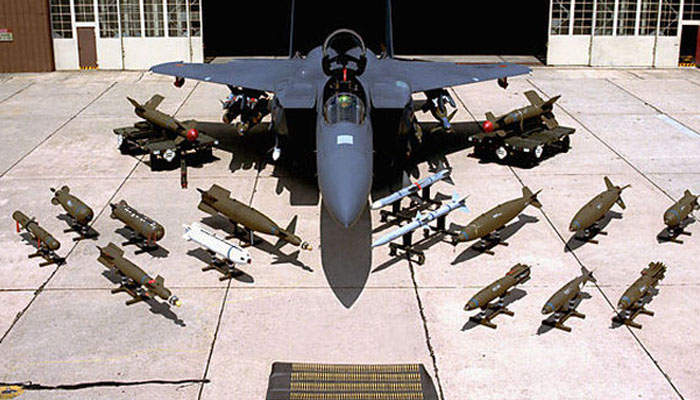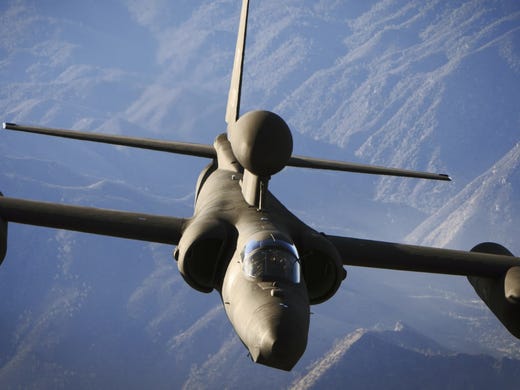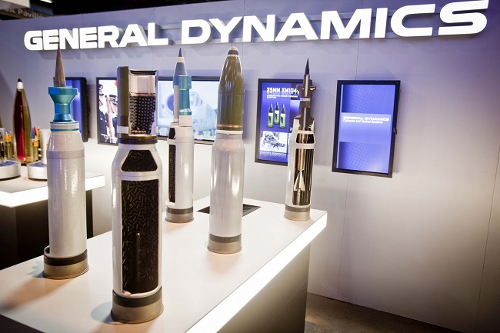
Top Four Firms Dominate US Arms Sales to Saudi Arabia
90% of Trade Involves Raytheon, Boeing, Lockheed Martin, and General Dynamics
William D. Hartung / Center for International Policy
(July 29, 2019) — In the wake of President Trump’s veto of three Congressional resolutions that would have blocked sales of precision-guided bombs and other equipment to Saudi Arabia, a new report by the Center for International Policy documents the central role of four major US arms contractors in arming the Saudi regime.
“Not surprisingly, President Trump emphasized ‘economic competitiveness,’ in his veto message on the Saudi arms deals, a veiled reference to his policy of favoring the interests of US defense companies over human rights and strategic concerns,” said William D. Hartung, the co-author of the report.
In all, 90% of US arms offers to Saudi Arabia — measured by the value of the deals — have involved one of the top four suppliers: Raytheon, Boeing, Lockheed Martin, or General Dynamics. Many of these sales involve bombs, missiles, and aircraft that have been used in Saudi Arabia’s brutal war in Yemen, killing thousands of civilians.
“Saudi Arabia’s indiscriminate air strikes in Yemen have hit marketplaces, hospitals, weddings, funerals, and even a school bus,” said Hartung. “The US government and the companies that supply the weapons used in these attacks bear responsibility for bringing this killing to an end by cutting off arms supplies to the Saudi regime.”
The four companies analyzed in the report were involved in 27 arms offers to Saudi Arabia notified to Congress between 2009 and May 2019, worth a total of over $125 billion. This compares to 51 total US arms offers to that nation since 2009, worth a total of $138 billion.
All of the largest deals since 2009 have involved the top four companies, including a $1.5 billion deal to purchase and coproduce Raytheon Paveway bombs that was part of the Trump administration’s recent “emergency” arms package; a $29 billion deal for Boeing F-15 aircraft and related equipment; a $25 billion deal involving Boeing Apache helicopters; a $15 billion deal for a Lockheed Martin THAAD missile defense system; a $10 billion deal for Lockheed Martin Multi-Mission Surface Combatant ships; a $5.4 billion deal for a Raytheon PAC-3 missile defense system; and a $1.15 billion deal for General Dynamics M-1 tanks.
Company officials have largely evaded responsibility for the consequences of their arms sales to Saudi Arabia, arguing in essence that they are simply following US government policy. “These four companies represent the lion’s share of profits from a humanitarian crisis, and especially at a time where Congress and the American people are critical of the war in Yemen, defense contractors should not be able to shield themselves behind US policy,” said Cassandra Stimpson, report co-author.
A summary of arms offers to Saudi Arabia involving US companies is as follows:

Raytheon
Raytheon has been involved in 15 major arms offers to Saudi Arabia. The deals include thousands of air-to-air and air-to-ground missiles as well as Paveway laser-guided bombs. The Paveway has been used in the Saudi bombing campaign in Yemen. The report’s appendix has a full list of arms offers to Saudi Arabia since 2009, organized by company.

Lockheed Martin Lockheed Martin has been involved in 15 major arms offers to Saudi Arabia. The deals include over 4,700 Hellfire air-to-ground missiles, 20 C-130J transport aircraft, KC-130J refueling aircraft, Patriot missile defense systems, 4 Multi-Mission Surface Combatant naval vessels, and a THAAD missile defense system.

Boeing Boeing has been involved in 10 major arms offers to Saudi Arabia. The deals include 84 F-15SA combat aircraft, 60 Apache attack helicopters, 36 AH-6i light attack helicopters, 1,000 small diameter bombs (SDB), and 48 Chinook transport helicopters. The F-15s are a staple of the Saudi-led air war in Yemen.

General Dynamics General Dynamics has been involved in six major arms offers to Saudi Arabia. The deals include 7,800 2000-pound bombs, 141 Light-Armored Vehicles, 153 M-1 tanks, and 60,000 155mm high explosive projectiles for the Royal Saudi Land Forces (RSLF). Both the 2000-pound bombs and the M-1 tanks have been used in the Yemen war.
William D. Hartung, Center for International Policy, New York Office. Phone: 917-923-3202 @WilliamHartung. www.international policy.org
US Arms Sales to Saudi Arabia: The Corporate Connection
This report covers arms offers to Saudi Arabia that have been officially notified to Con- gress from 2009 to May 2019.
The four companies analyzed in this report — Raytheon, Lockheed Martin, Boeing, and General Dynamics — were involved in the majority of arms offers notified to Congress from Fiscal 2009 through May 2019. In all, the four companies were involved in 27 offers worth over $125 billion, out of a total of 51 offers to Saudi Arabia worth $138 billion. In other words, over 90% of US arms offers to Saudi Arabia by value involved one of the top four supplying firms.
The brutal Saudi-led bombing campaign in Yemen has utilized US-supplied weaponry to target civilians, causing the deaths of thousands. Since the kingdom launched its war in Yemen in 2015, indiscriminate air strikes carried out by the Saudi-led coalition have hit marketplaces, hospitals, civilian neighborhoods, water treatment centers and a school bus.
American-made bombs have repeatedly been used in these incidents, including at a wedding, where 21 people, including children, were killed by a GBU-12 Paveway II guided bomb manufactured by Raytheon. A General Dynamics 2000-pound bomb with a Boeing JDAM guidance system was used in a March 2016 strike on a marketplace that killed 97 civilians, including 25 children.
A Lockheed Martin laser-guided bomb was utilized in an August 2018 attack on a school bus that killed 51 people, including 40 children. A September 2018 report by the Yemeni group Mwatana for Human Rights identified 19 air strikes on civilians that involved the use of US-supplied weapons, noting that the strike on the school bus was “not an isolated incident, but the latest in a series of gruesome [Saudi-led] Coalition attacks involving US weapons.”
In the recent “emergency” deal arms deal to Saudi Arabia and the United Arab Emirates put forward by President Trump on May 24th of 2019, $4.346 billion of the overall $8.1 billion went to Saudi arms sales involving one of the top four companies analyzed in this report, including a $1.571 billion deal for the sale and coproduction of Raytheon Paveway bombs and two separate deals totaling $2.6 billion for maintenance and training related to Saudi-owned systems like the Boeing F-15 combat aircraft and the Lockheed Martin C-130 transport plane.
All of the largest
sales to Saudi Arabia since 2009, including a $29 billion deal for Boe-
ing F-15 aircraft, a $25 billion deal for Boeing Apache helicopters, a $15
billion deal for a Lockheed Martin THAAD missile defense system, a $10 billion
deal for Lockheed Martin Multi-Mission Surface Combatant ships, and a $5.4
billion deal for Raytheon PAC-3 missile defense interceptors, involved one of
the major firms analyzed here as the primary supplier.
Company officials have largely dodged responsibility, moral or otherwise, for the actions of their Saudi clients in Yemen, arguing that they are just following US government pol- icy. As Raytheon chief financial officer Toby O’Brien put it in a call to investors that came after the murder of Jamal Khashoggi, “We continue to be aligned with the administra- tion’s policies, and we intend to honor our commitments.”
Lockheed Martin CEO Marillyn Hewson made a similar point, asserting that “Most of these agreements that we have are government-to-government purchases, so anything that we do has to follow strictly the regulations of the US government…Beyond that, we’ll just work with the US government as they are continuing their relationship with Saudi [Arabia].”
Background
The brutal Saudi-led bombing campaign in Yemen has utilized US-supplied weaponry to target civilians, causing the deaths of thousands. Saudi Arabia’s relationship with US arms companies has become increasingly controversial, especially after the murder of Jamal Khashoggi in 2018.
Since the kingdom launched its war in Yemen in 2015, indiscriminate air strikes carried out by the Saudi-led coalition have hit marketplaces, hospitals, civilian neighborhoods, water treatment centers and a school bus.
American-made bombs have repeatedly been used in these incidents, including at a wedding, where 21 people, including children, were killed by a GBU-12 Paveway II guided bomb manufactured by Raytheon. A General Dynamics 2000-pound bomb with a Boeing JDAM guidance system was used in a March 2016 strike on a marketplace that killed 97 civilians, including 25 children. And a Lockheed Martin laser-guided bomb was utilized in an August 2018 attack on a school bus that killed 51 people, including 40 children.
A September 2018 report by the Yemeni group Mwatana for Human Rights identified 19 air strikes on civilians that involved the use of US-supplied weapons, noting that the strike on the school bus was “not an isolated incident, but the latest in a series of gruesome [Saudi-led] Coalition attacks involving US weapons.”
US weapons used by the Saudi-led coalition have also been diverted to third parties in- volved in the Yemen war, even ending up in the hands of sectarian militias and fighters or militias with ties to Al Qaeda in the Arabian Peninsula.
In total, civilian casualties from the fighting in Yemen total over 11,700, two-thirds of which are due to actions by the Saudi-led coalition — estimates that are likely underre- ported. Many casualties are directly linked to approximately 20,000 Saudi-led coalition air raids, which have employed US bombs, missiles, and combat aircraft. Still, the Trump administration has pursued an aggressive arms sales agenda toward Saudi Arabia and its allies.
The US military has attempted to address concerns regarding civilian casualties through training of Saudi troops and the transfer of precision-guided bombs. However, confidence that more precise targeting will lead to lower civilian casualties assumes that civilians are not being purposefully targeted — a claim increasingly difficult to substantiate.
Surges of violence around Yemen, a naval blockade implemented by the Saudi-led coalition, and obstruction by the Houthi-led opposition have limited humanitarian aid and restricted movement of goods, leading to immeasurable suffering. Already, over one million people have contracted cholera in the largest outbreak ever recorded, which neared 30,000 new cases a week in 2019.
The United Nations estimates that 14 million people may be affected by famine, and that 230,000 Yemenis will have died over the course of the war by the end of 2019, 140,000 of them children. Over 255,000 people have been displaced in just the past six months. These numbers may be too large to conceptualize, but suffice to say that the war in Yemen is the world’s worst humanitarian crisis, according to the UN.
Though Saudi Arabia and the United Arab Emirates (UAE) have pledged humanitarian aid funds, these efforts do little to counteract the overwhelming violence and destruction brought forth by their coalition, especially given recent reports that these promised funds have not been disbursed after four months.
The United Arab Emirates has announced a substantial pullback of its troops from Yemen, but it will maintain a continued presence there, ostensibly to maintain the capability to collaborate with the United States in the fight against Al Qaeda in the Arabian Peninsula. In addition, as an analysis by the New York Times has noted, the UAE withdrawal from areas involving fighting with the Houthi coalition will not be total: “The Emiratis will maintain a reduced presence in Aden, the main city in the south, and will continue to support a coalition of about 16 Yemeni militias, estimated to number about 20,000 men, who have been doing most of the fighting along the Red Sea coast in the Hudaydah area.”
The humanitarian crisis, combined with a larger pattern of improper Saudi conduct, has generated growing opposition to Saudi Arabia in Congress. In the summer of 2017, an unprecedented Senate vote attempted to block a sale of precision-guided munitions to the Saudi Royal Saudi Air Force (RSAF), barely allowing the deal to pass in a close 53 to 47 vote.
This effort was renewed through multiple amendments to the House version of the 2018 National Defense Authorization Act that attempted to restrict US military support for the Saudi war effort in Yemen. In April 2019, congress invoked the 1973 War Powers Resolution for the first time ever in a joint resolution to end support for the Saudi-led cam- paign in Yemen, which was quickly vetoed by President Trump.
In order to bypass congressional oversight on security assistance and arms deals, Pres- ident Trump declared an emergency under the Arms Export Control Act (AECA) in May 2019. This emergency provision cemented $8.1 billion in arms sales to Saudi Arabia, Jordan, and the United Arab Emirates that have been stymied by Congress since 2018.
In June, a bipartisan group of Senators voted to block the ‘emergency’ arms sales. The House of Representatives followed suit in July, passing resolutions that would block the sale and coproduction of Paveway precision-guided munitions to Saudi Arabia. President Trump vetoed the resolutions citing potential alliance damage and the Iranian threat, arguments that don’t hold up to scrutiny in the larger context of the devastating impacts of the Saudi-led intervention in Yemen.
It should be noted that the Raytheon Paveway bombs included in the recent emergency offer will be co-produced in Saudi Arabia, further undermining the Trump administration’s argument that Saudi arms sales will be a major source of jobs in the United States.
Charles Faulkner, a long time Raytheon lobbyist turned deputy assistant secretary at the State Department, resigned in early May after pushing for the emergency declaration. In addition, in 2018 the State Department’s Bureau of Legislative Affairs, headed by Faulkner, pushed Secretary of State Mike Pompeo to certify to Congress that Saudi Arabia and the UAE were taking care to avoid inflicting civilian casualties in their air war in Yemen, in order to clear the way for a major sale of Raytheon precision-guided munitions.
The strong incentives from inside defense agencies, ex-defense employees turned govern- ment officials, and Washington hawks to continue arms sales to Saudi Arabia have pushed aside humanitarian, congressional, and security concerns. Despite recent pushback, Saudi Arabia still received more US defense exports than any country from 2010-2018.
This report provides information on arms offers to Saudi Arabia involving the four largest US arms suppliers to that nation: Raytheon, Lockheed Martin, Boeing, and General Dynamics. The analysis covers offers notified to Congress, not all of which have yet resulted in final deliveries of the equipment; and data on weapons deliveries gathered from the Stockholm International Peace Research Institute (SIPRI) arms transfer data-base.
READ the complete report online here.
Posted in accordance with Title 17, Section 107, US Code, for noncommercial, educational purposes